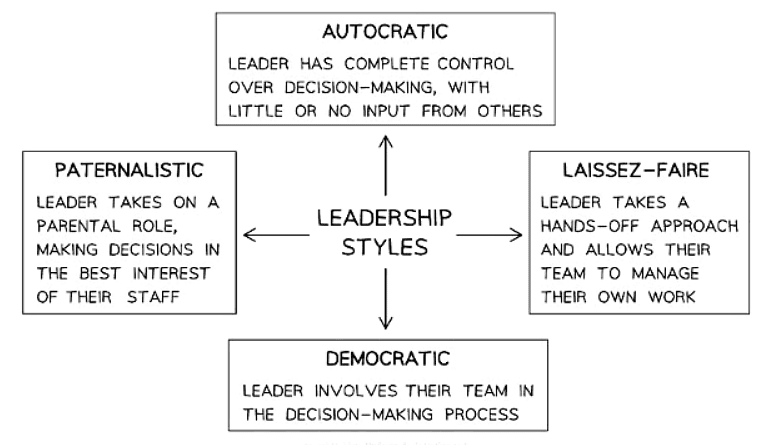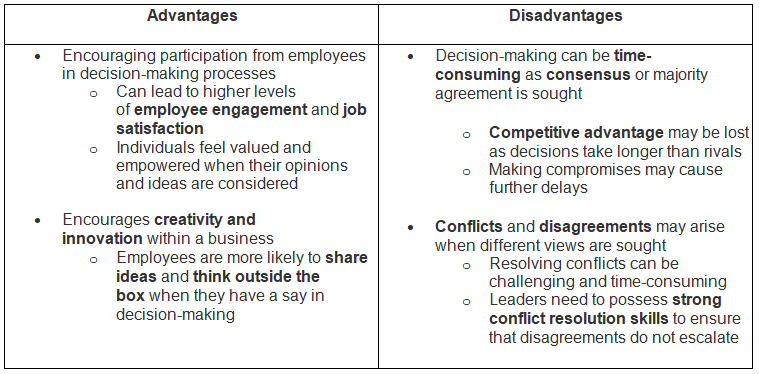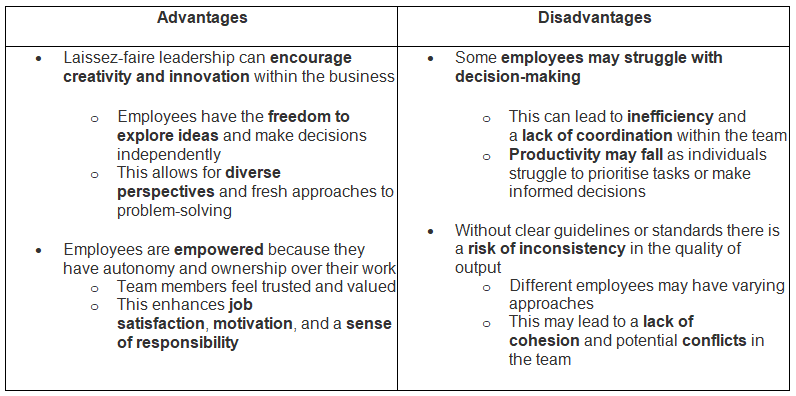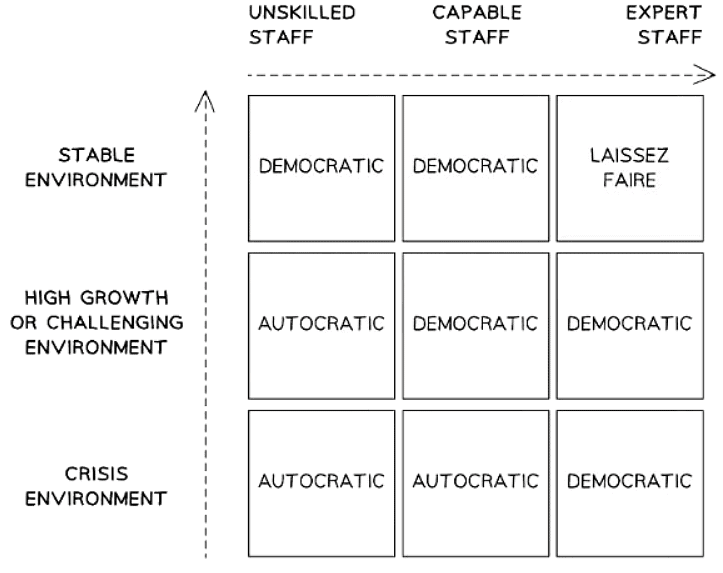Class 10 Exam > Class 10 Notes > Business Studies for GCSE/IGCSE > Leadership Styles
Leadership Styles | Business Studies for GCSE/IGCSE - Class 10 PDF Download
Types of Leadership Styles
- Leadership is about having a vision, sharing that vision with others, and providing direction
- Leadership is necessary in various contexts.
- For instance, a sports leader could be the captain of a national football or basketball team.
- Similarly, a political leader could hold the position of a president, prime minister, or leader of a political group.
- Leaders have the ability to inspire and motivate others to collaborate towards a common objective.
- This not only helps in achieving aims and objectives but also aids in fostering a motivated workforce.
Leadership Styles
- Leadership styles are a reflection of a leader's behaviors and attitudes towards their team members, significantly impacting the organizational culture, productivity, and overall performance of a business.
- Successful leaders possess the ability to adapt and utilize a diverse range of leadership styles based on the specific situation, aiming to attain optimal results for their organization.
Different Leadership Styles

Autocratic Leadership
- An autocratic leader possesses absolute power and authority within the business.
- Leaders determine the direction and goals of the business, making decisions without consulting others.
- Team members' opinions, ideas, or expertise are usually disregarded.
- Decisions are typically non-negotiable and closed to discussion or debate.
- Subordinates are expected to adhere strictly and comply with commands.
- Communication in this leadership style is predominantly one-way, known as 'top-down.'
Advantages & Disadvantages of Autocratic Leadership

Question for Leadership StylesTry yourself: Which leadership style is characterized by a leader possessing absolute power and authority within the business and making decisions without consulting others?View Solution
Democratic Leadership
- Involve Employees: Democratic leaders actively engage employees in decision-making, fostering discussion and collaboration.
- Encourage Discussion: They promote open dialogue and idea sharing, although they retain final decision-making authority.
- Consultation and Collaboration: Involving consultation, collaboration, delegation, and teamwork, democratic leadership encourages a participative approach.
- Effective in Skilled Organizations: This leadership style thrives in environments with skilled and experienced employees.
- Suitability in Creative Industries: Particularly effective in creative sectors, where managers empower workers to collaborate on projects and manage their time autonomously.
- Example: James Parker, the former CEO of Southwestern Airlines, exemplified democratic leadership in his practices. In his book "Do the Right Thing," he emphasized the importance of trust and empowerment. Parker's approach revolved around expecting the best from people, trusting them, and empowering them to make decisions. He famously said, "I've always tried to expect the best of people and to trust them, and I have almost never been disappointed. Part of trusting people is empowering them to make decisions."
Advantages and Disadvantages of Democratic Leadership

Laissez-faire Leadership
- Laissez-faire leadership involves leaders playing a minimal role in managing subordinates or business teams. They provide little guidance, direction, or supervision to employees.
- This leadership style grants employees significant autonomy and freedom in decision-making and task completion.
- It is most suitable when leaders are working with a highly skilled and self-motivated team that requires minimal supervision.
- However, communication may suffer in such organizations due to the lack of clear direction provided.
Advantages and Disadvantages of Laissez-faire Leadership

Recommending an Appropriate Leadership Style
- The selection of a leadership approach is influenced by various factors, such as:
- Business circumstances, encompassing the company's nature and size
- Objectives and goals to be accomplished
- The leader's personality, experience, and competencies
- Key points to consider include:
- Business circumstances, reflecting the organization's scale and nature
- Objectives to be attained
- The leader's personal traits, past experiences, and proficiencies
- Specifically, the workforce's skills, capabilities, and the competitive business environment significantly influence the chosen leadership style
Appropriate Leadership Styles

Choosing the most appropriate style
- During times of crisis and when employees lack expertise, employing an autocratic leadership style is often most suitable.
- Conversely, in situations where employees possess advanced skills, a democratic leadership style tends to be more effective.
- In a stable work environment with unskilled employees, a democratic leadership style is typically the best choice.
- However, if the workforce is highly skilled in a stable setting, a laissez-faire leadership approach may yield better results.
- When a business operates in a dynamic, challenging environment with unskilled workers, an autocratic leadership style is often preferred.
- On the other hand, in such environments with highly skilled employees, a democratic leadership style is usually more advantageous.
Question for Leadership StylesTry yourself: Which leadership style is most suitable when working with highly skilled and self-motivated employees?View Solution
The document Leadership Styles | Business Studies for GCSE/IGCSE - Class 10 is a part of the Class 10 Course Business Studies for GCSE/IGCSE.
All you need of Class 10 at this link: Class 10
|
70 videos|93 docs|26 tests
|
FAQs on Leadership Styles - Business Studies for GCSE/IGCSE - Class 10
| 1. What are the main types of leadership styles discussed in the article? |  |
Ans. The main types of leadership styles discussed in the article include autocratic, democratic, laissez-faire, transformational, and transactional.
| 2. How can a leader determine which leadership style is most appropriate for a given situation? |  |
Ans. A leader can determine the most appropriate leadership style for a given situation by considering factors such as the nature of the task, the skills and experience of the team members, and the level of autonomy required.
| 3. Can a leader use a combination of different leadership styles? |  |
Ans. Yes, a leader can use a combination of different leadership styles depending on the situation and the needs of the team. This approach is known as situational leadership.
| 4. How does the autocratic leadership style differ from the democratic leadership style? |  |
Ans. The autocratic leadership style is characterized by a leader making decisions without input from team members, while the democratic leadership style involves involving team members in decision-making processes.
| 5. What are the potential advantages and disadvantages of each leadership style mentioned in the article? |  |
Ans. The potential advantages and disadvantages of each leadership style mentioned in the article vary, with some styles being more effective in certain situations than others. It is important for leaders to understand the strengths and weaknesses of each style to apply them appropriately.
Related Searches




















